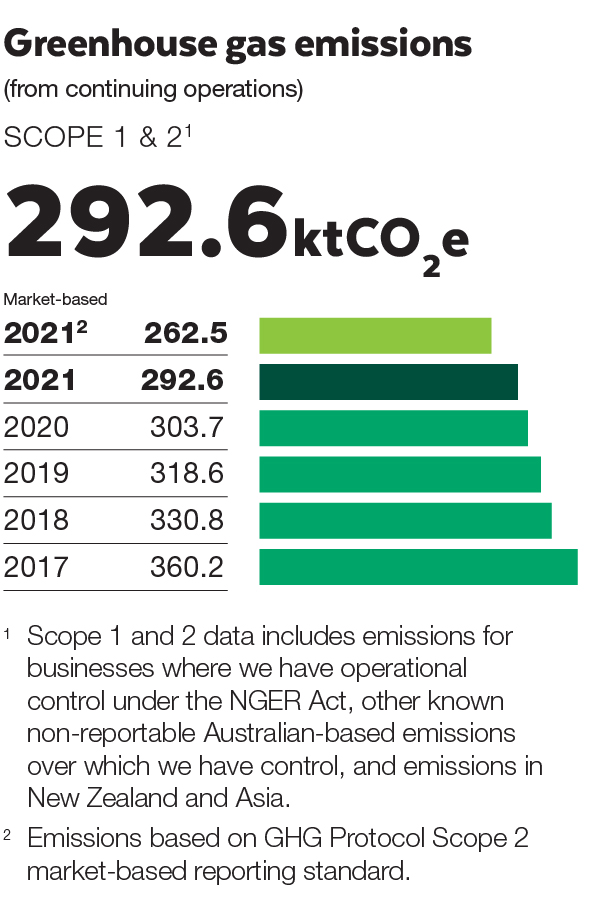Kmart Group - Natural resources
 As a large retailer of products that consume natural resources in many steps of the production process, Kmart Group has a responsibility to use natural resources responsibly and source materials in a way that minimises environmental impact.
As a large retailer of products that consume natural resources in many steps of the production process, Kmart Group has a responsibility to use natural resources responsibly and source materials in a way that minimises environmental impact.
Accordingly, the sustainable use of natural resources continues to be a key focus of Kmart Group’s sustainability commitments.
Energy and climate
In the 2021 financial year, Kmart Group achieved a 26.5 per cent year-on-year reduction in its electricity use per square-metre of its stores’ gross footprint. The continued reduction against the prior year is attributed to the ongoing impact on store operations induced by COVID-19 coupled with changes in the Target store network. The reduction in energy usage was maintained via continuous energy monitoring and mitigation of increase energy events. Relatively milder weather in the second half of the financial year also contributed to the net decrease in energy consumption.
Kmart Group’s focus over the next financial year will be on planning to complete energy efficiency projects relating to LED lighting, in conjunction with introducing renewable energy procurement in line with Kmart Group sustainability targets. To read more about our energy efficiency achievements see here.
With respect to broader climate efforts, Kmart Group has previously set robust Scope 1 and Scope 2 greenhouse gas emissions targets to achieve significant emission reductions in owned and controlled operations by 2030. This financial year has seen a focus on developing a Scope 3 playbook, which sets the direction through to 2030 to manage greenhouse gas emissions in Kmart Group supply chains. This has been developed leveraging our involvement in the United Nations sanctioned Fashion Industry Charter for Climate Action.
As one of the first steps to address Scope 3 emissions, a cross-functional Climate Action Working Group was established to build capacities, knowledge and engagement with team members and support climate-related initiatives across the Group. Kmart Group has also expanded its Scope 3 inventory reporting to include all material categories of emissions for the first time, laying the groundwork for defining a Scope 3 baseline, a key milestone in the work on Scope 3.
Water and chemicals
Minimising water usage and restricting chemicals used in production, such as dyes, colourants and solvents, is important to ensure product safety and to reduce risk to water systems. Managing this risk is particularly critical in the production of apparel and textile products given the high use of water in the washing and dyeing processes of fabric mills and laundries.
Kmart Group has committed to two time-bound targets to minimise its impacts on water. To support the implementation of these commitments with suppliers, the business has joined the Sustainable Apparel Coalition (SAC) and Zero Discharge of Hazardous Chemicals (ZDHC) foundation.
In the past year, Kmart Group developed a phased implementation roadmap to meet ZDHC compliance requirements, with the current focus being on wet processing facilities used by strategic suppliers. Kmart Group has now registered approximately 76 per cent of the wet processing facilities (e.g. mills, laundries) used by strategic suppliers onto the ZDHC Gateway platform, with approximately 68 per cent reporting wastewater test results and 40 per cent reporting compliance with the chemical inventory MRSL (manufacturing restricted substance list).
In the year ahead, Kmart Group will continue to work closely with its strategic suppliers on ZDHC compliance, while working with wet processing facilities to baseline water usage and set targets for improvement.
Sustainable materials
During the year, Kmart and Target continued the implementation of their sustainable material commitments, working towards the responsible sourcing of key materials, including cotton, polyester, cellulose and timber.
In July 2020, Kmart reached a significant milestone, meeting its 100 per cent sustainably sourced cotton commitment. This means that from 1 July 2020 onwards, all of the cotton sourced for Kmart own-brand clothing, bedding and towels has been ordered as Better Cotton, organic or recycled. To celebrate this achievement with customers, Kmart launched a digital campaign to explain the important environmental and social benefits of sustainable cotton farming and the impact of this commitment on the environment and in the lives of cotton farmers globally. Target is on track to sourcing 100 per cent of the cotton for its own-brand clothing, bedding and towels as Better Cotton, organic or recycled to meet its cotton commitment from 1 July 2021 onwards.
Building on the success of Kmart and Target’s recycled active wear ranges launched in the previous financial year, both businesses extended their use of recycled materials across a wide range of product categories, including knitwear, outerwear, denim, swimwear and footwear. In addition, Kmart Group has joined the Circular Fashion Partnership, a cross-sector project led by the Global Fashion Agenda, in partnership with Reverse Resources, Bangladesh Garment Manufacturers and Exporters Association and P4G, to develop long-term scalable solutions for capturing and reusing post-production textile waste. See more about our circular fashion efforts here.
During the year, Kmart launched its first range of Forest Stewardship® certified wooden toys as well as its first apparel range containing viscose fibres made from wood pulp sourced from certified responsibly managed forests and converted into fibres using less energy and water compared to conventional methods.
As of June 2021, Kmart has phased out 10 priority single-use plastic products across its party range.
